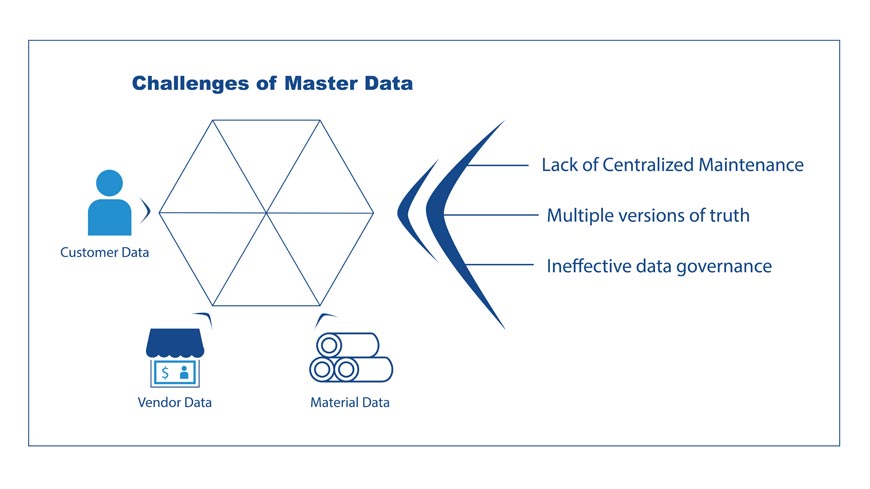How accurate Master Data drives reduced Data Maintenance
04 January 2022


Richard Pascoe
Vice President - Consulting ServicesRichard Pascoe is the VP- Consulting Services, Applexus Technologies, UK. An experienced leader and business development manager, Richard has been accountable for the success of the...
Master data, which forms the core data of an enterprise, lays the foundation for the smooth running of business processes and data driven decision making. Examples of master data could be Product information, supplier information, employee information etc. that are referenced in business transactions. The effective handling of master data has become all too critical for any organization as it directly affects the decision-making capability, business processes, operational efficiency and supply chain metrics.
Challenges with master data
There are numerous master data related challenges that companies must overcome to enjoy the full potential of an ERP system such as SAP. All process improvements via automation can only work if the master data is accurate and up to date. The age old saying of Garbage in, garbage out still holds true.
Lets take a look at some of the major challenges with master data
1. Lack of Centralized Maintenance
Low master data quality may translate into incorrect payments, wrong delivery times, missed orders and other issues. With data volumes growing consistently, maintaining high quality master data becomes cumbersome. SAP employs decentralized data model where various line of businesses can maintain the same master data, creating their own specific view. A central master data team can maintain and ensure up-to-date master data but that introduces delay in the process and any deviation can cause inconsistent data as well.
2. Multiple versions of truth
Often when data is handled separately by business functions and executives, data gets duplicated and redundant. This again can have untoward consequences such as double ordering, incorrect reporting, different people speaking to the same vendor etc. Master data needs to be a single source of truth for the entire organization and having duplicate data can impact decision-making ability. Duplicity could be avoided by eliminating multiple sources for data and using unique master data names that cannot be mistyped. Newly entered master data must be validated with existing records to avoid duplication.
3. Ineffective data governance
Ineffective data governance is a key contributor to failure in managing master data. A robust Data governance model, either centralized or decentralized, ensures data consistency and integrity across all master data objects, compliance, privacy and security, accessibility and accountability. Assigning authority over data assets to the right people, mapping accountability for managing data from creation to consumption and defining a roadmap addressing the future state of data governance is essential to ensure an effective data governance is in place.

Benefits of maintaining master data
Accurate master data provides a foundation that enables sound decision making and the ability to draw insights. The long-term business value gained from maintaining accurate business ready master data is immense. Let’s look at few of those key benefits.
1. Single Source of Truth drives Process Automation
Accurate master data forms a single source of truth supporting all business processes. Each department can access the latest master data and automate various processes to drive efficiency. For instance, if you were to maintain data accurately around a product – information such as the supplier, alternate vendors, lead times for each vendor, price from each vendor, its dimensions and weight etc. you could then automate interconnected processes such as sales of the product and inventory management as per the demand estimate.
2. Reduced Effort in Generating Insights
Maintaining accurate master data ensures that you spend a lot less effort on transactional data maintenance. For every order the buyer raises, he already knows what the price is, who the supplier is and what the lead times are etc. The objective is to reduce non value adding activities in form of acquiring and cleaning the data stemming from a poorly maintained master data plagues with inaccuracy, duplicate records and inconsistencies. Executives can generate insights faster and put their effort elsewhere e.g negotiations.
3. Trust, Confidence, and Adoption
The entire organization relies on up-to date and accurate master data to take informed data driven decisions. As the single source of truth master data helps business leaders take the right decisions for long term growth. This means executives need to trust the quality of reporting and analytics or else there will be disinterest in adopting the technology. True ROI of a technology investment always relies on users finally being able to use the technology.
Use Case: Benefits of maintaining master data - Demand Forecasting
Demand forecasting in line with the seasonal change in business is a critical use case that leverages master data management. This is especially relevant in the fashion industry, where demand volatility, a shortage of historical data and seasonal trends are all frequent. In an ideal world managed by master data, a quick response system would allow businesses to adjust production of different styles, colors, and sizes in response to retail sales during a season. This could then be used to effectively manage the inventory needed for operating in that specific business environment.
A comprehensive master data governance framework enables users to manage data across multiple platforms unified under a single source. Aligning master data with business policies and single-point of access for all users to obtain the same data through a role-based interface results in following functional benefits:
- Improved operational efficiency
- 360-degree view of customers and suppliers
- Reduced supply chain complexity
- Focus more on value-add areas
These benefits drive the ability to apply a variety of appropriate forecasting methods aided by adding season information to sales orders and make use of mass change tools to manage historical data. It also increases supply chain efficiency by reducing time, effort and margin of error as well as providing better analytics for season performance tracking.
How Applexus helps?
With numerous transactions taking place each day, the volume of data to be handled is growing rapidly. And this in turn makes it difficult to get your data right to take advantage of it.
Applexus offers a comprehensive set of expert services for data management that can be delivered as part of an Applexus Prime engagement or in a plug-and-play model with another systems integrator or even a customer led implementation program.












